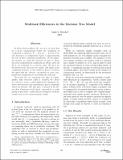Multitask efficiencies in the decision tree model
Author(s)
Drucker, Andrew Donald
DownloadDrucker-2009-Multitask efficiencies in the decision tree model.pdf (380.1Kb)
PUBLISHER_POLICY
Publisher Policy
Article is made available in accordance with the publisher's policy and may be subject to US copyright law. Please refer to the publisher's site for terms of use.
Alternative title
Multitask Efficiencies in the Decision Tree Model
Terms of use
Metadata
Show full item recordAbstract
In Direct Sum problems |8|, one tries to show that for a given computational model, the complexity of computing a collection F = {f[subscript 1](x[subscript 1]),[subscript hellip] f[subscript 1](x[subscript 1])} of finite functions on independent inputs is approximately the sum of their individual complexities. In this paper, by contrast, we study the diversity of ways in which the joint computational complexity can behave when all the f[subscript i] are evaluated on a common input. We focus on the deterministic decision tree model, with depth as the complexity measure; in this model we prove a result to the effect that the 'obvious' constraints on joint computational complexity are essentially the only ones. The proof uses an intriguing new type of cryptographic data structure called a `mystery bin' which we construct using a small polynomial separation between deterministic and unambiguous query complexity shown by Savicky. We also pose a variant of the Direct Sum Conjecture of |8| which, if proved for a single family of functions, could yield an analogous result for models such as the communication model.
Date issued
2009-09Department
Massachusetts Institute of Technology. Department of Electrical Engineering and Computer ScienceJournal
Proceedings of the 24th Annual IEEE Conference on Computational Complexity, 2009
Publisher
Institute of Electrical and Electronics Engineers
Citation
Drucker, A. “Multitask Efficiencies in the Decision Tree Model.” Computational Complexity, 2009. CCC '09. 24th Annual IEEE Conference on. 2009. 286-297. © 2009 IEEE
Version: Final published version
Other identifiers
INSPEC Accession Number: 10862326
ISBN
978-0-7695-3717-7
ISSN
1093-0159